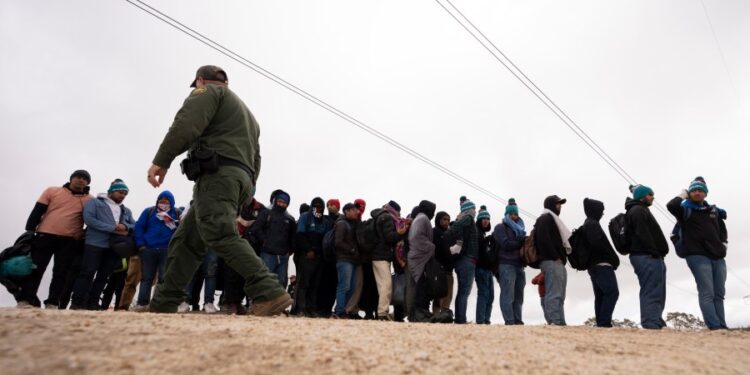
CHICAGO (NewsNation) — Migrants in Chicago are growing increasingly anxious as they brace for potential mass deportation raids, which could begin as soon as Tuesday.
On Monday, President Donald Trump signed several executive orders related to immigration, including declaring a national emergency at the border.
According to the Wall Street Journal, four people familiar with the plan said on the day after Trump’s inauguration, U.S. Immigration and Customs Enforcement (ICE) will send “between 100 and 200 officers” for the operation.
In December, Trump’s incoming border czar, Tom Homan, told Chicagoans the largest deportation operation in history was set to start on Tuesday. However, it’s uncertain whether the raids will begin as planned, given the extremely cold temperatures and leads about the operation.
When can we expect to see mass deportations start?
Federal immigration officers are expected to target more than 300 people in Chicago with histories of violent crimes, according to an official who spoke anonymously to NewsNation over the weekend.
Additionally, Trump aids have indicated they may arrest others, like spouses or roommates, who aren’t the primary target but are also in the country illegally. Still, Trump hasn’t provided any specific timeline for the deportation.
“I don’t want to say when, but it’s going to happen. It has to happen, or we’re not going to have a country left,” Trump said Monday when asked if ICE raids would start Tuesday.
Illinois Democratic Gov. JB Pritzker emphasized that ripping families apart is not acceptable to Americans and asserted that the state will stand up for those affected. However, immigrant rights groups say the hundreds of thousands of undocumented immigrants in Chicago are living in fear as raids loom.
How are undocumented Chicagoans preparing for potential raids?
Some Chicago churches have canceled in-person services to protect churchgoers from potential immigration roundups.
Meanwhile, immigrant advocacy groups have distributed flyers and held workshops to educate undocumented people about their rights.
Elena Barrera, who has lived in the Chicago area without legal status for nearly 27 years, shared her fears. A mother of three, including a 9-year-old, Barrera worries about the trauma her family would face if she were detained by ICE agents.
“(My son) doesn’t want to go to Mexico because he has his school here. He has lived his whole life here. He cries. Nothing has happened yet, but he is already anxious. He is thinking, “What will I do without my mom?'” she said.
Organizations like the Illinois Coalition for Immigrant and Refugee Rights advise that those fearing a raid do not open the door if ICE agents come knocking. They also urge people to memorize the phone numbers of loved ones in case their phones are taken during an arrest.
Pritzker and Chicago Mayor Brandon Johnson said the city’s law forbids Chicago police officers from coordinating with ICE.
Chicago Public Schools, the Chicago Transit Authority, the Chicago Park District and Community Colleges of Chicago have all been directed not to allow ICE access into any of their buildings.
Trump’s deportation plans are a ‘disgrace’: Pope Francis
On Sunday, Pope Francis appeared on a popular Italian talk show, “Che Tempo Che Fa,” where he called Trump’s mass deportation plans a “disgrace.”
“If true, this will be a disgrace because it makes poor wretches who have nothing pay the bill,” for the problem, Francis said. “This won’t do! This is not the way to solve things. That’s not how things are resolved.”
Bishop Robert Casey, vicar general of the Archdiocese of Chicago, has been a Catholic priest for 30 years.
“For all those 30 years, I have found myself living in a nation that’s struggled with immigration reform,” said Casey, whose parents were immigrants. “I think it’s important to recognize … what Pope Francis reminds us, that we’re dealing with people with faces and names. This is not just an issue on paper.”
Casey added that people are afraid and anxious because there is so much unknown about what to expect and when it will happen.
“For many of our immigrants, they have been able to build a life here and contribute greatly to the foundations that our city is built on, and they’re at the core of who we are as a community and as churches,” he said. “But at the same time, amidst that blessing, there is the challenge that people don’t want to welcome the stranger, that don’t want to welcome the migrant in our midst.”







